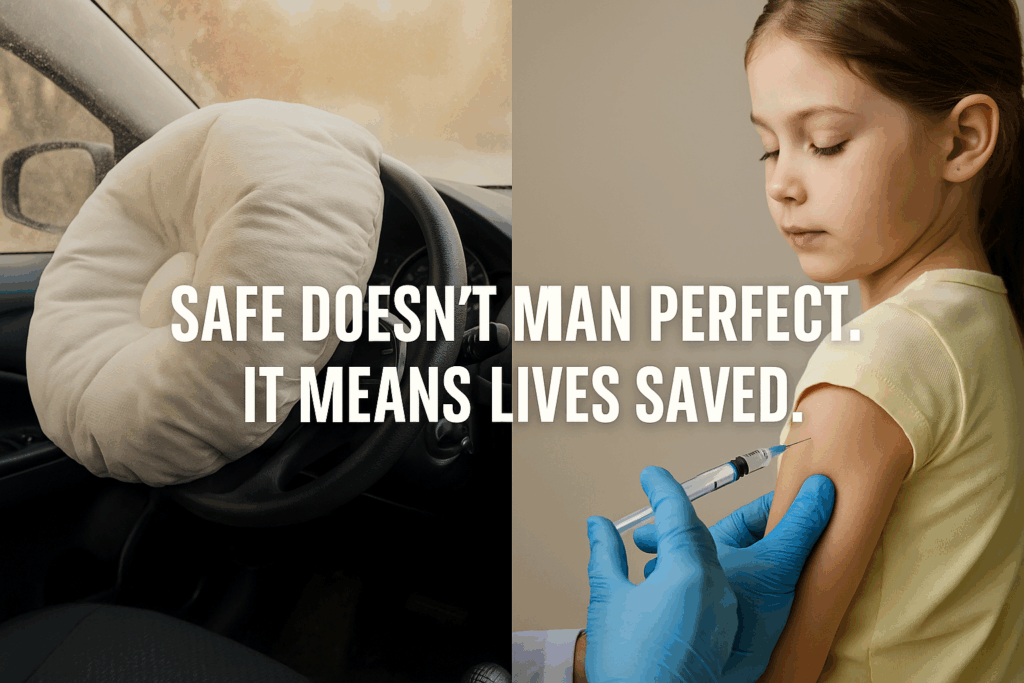I read a Facebook post recently that made me really pause and think – not because I totally agreed with it, but because I understand where it’s coming from. The author shared a list of children whose lives were lost or forever changed following vaccination. She shared their names and the grief of their parents. These stories are heartbreaking. And real.
The post pointed to a new documentary titled An Inconvenient Study – clearly a play on An Inconvenient Truth, the climate change documentary that made huge waves by daring to challenge entrenched denial around the topic. But here’s the irony: An Inconvenient Truth was rooted in rigorous and consensus science. An Inconvenient Study is the opposite.
It packages emotional stories – without epidemiological context – to seed doubt in one of the most life-saving public health interventions in human history.
And it’s time we talk about why that tactic works – and why it’s dangerous.
Safety Doesn’t Mean Perfection
Let’s start here: “Safe” doesn’t mean zero risk. It means that the benefits dramatically outweigh the risks. That’s true for medicine, for surgery, for anesthesia – and it’s true for vaccines.
We expect perfection from vaccines in a way we never do from nearly anything else. And that’s part of the problem.
Take airbags, for example. They’ve saved more than 50,000 lives in the U.S. alone since 1987, according to the NHTSA [^1]. But they’ve also caused injuries – and in some tragic cases, deaths. One of the most infamous examples? The Takata airbag recall, which led to at least 27 deaths and 400+ injuries worldwide [^2].
What did we do in response?
We didn’t ban airbags.
We didn’t say “airbags are a hoax.”
We didn’t abandon the science of crash protection.
We demanded better airbags. We improved the technology. We issued recalls. We held manufacturers accountable. Because airbags still save lives – even when imperfect.
Vaccines are the same.
The Vaccine Injury Compensation System: Built for Support, Not Blame
A common argument from vaccine skeptics is: “If vaccines are safe, why is there a compensation fund?” Even I asked it.
It’s a fair question – and the answer is revealing.
The Vaccine Injury Compensation Program (VICP) was created in 1986 to ensure a stable vaccine supply while providing support for the very rare cases where someone may have been harmed. It’s a no-fault system – meaning families don’t have to prove definitive scientific causation. If an adverse event happens within a certain timeframe and meets specific criteria, compensation may be awarded [^3].
This system was designed to support families, while financially protecting the pharmaceutical industry – not to adjudicate science. And that’s a good thing.
But when anti-vaccine influencers use these payouts as “proof” that vaccines are dangerous, they distort the system’s intent and dismiss the massive benefits gained by society from vaccines.
Revolving Doors and Double Standards: Why We Only Cry Corruption When It’s Convenient
Another go-to argument is the dreaded “revolving door”: former CDC officials now working for pharmaceutical companies, or vice versa.
Let’s be clear: this happens in every regulatory sector.
- People go from the FAA to Boeing.
- From the EPA to Exxon-funded think tanks.
- From the NHTSA to auto lobbying groups [^4].
And guess what? It rarely leads to mass conspiracy theories about planes, oil, or cars. No one’s screaming about “Big Auto” because of the Takata scandal – even though it took more than a decade to fully address.
So why do we reserve our most paranoid takes only for vaccines?
We need a better standard of scrutiny. Yes, conflicts of interest matter. But corruption isn’t proven by a LinkedIn resume. It’s proven by actions – and outcomes. And the outcomes for vaccines are crystal clear: millions of lives saved across generations, with relatively rare – but very real – adverse effects.
The Libertarian Fantasy Collides With Reality
Here’s the part no one talks about:
I’ve noticed a large portion of the anti-vaccine movement is powered by libertarian ideology – the belief that government should stay out of personal decisions. “My body, my choice.” “Don’t tread on me.” “Let me decide what’s best for my family.”
But where are those voices when disabled people – including children harmed by vaccines, genetics, or circumstance – need long-term care, education, or access to communication?
They are nowhere to be found.
They say they care about the vaccine-injured. But watch silently as the current administration guts Medicaid. They say nothing as funding and support for disabled students in public schools is slashed. The same goes for stripping away protections under IDEA. They look the other way while non-speaking autistic people are institutionalized, neglected, or denied basic tools to express themselves.
Guess what? You don’t get to scream about bodily autonomy at a school board meeting and then vote for politicians who cut funding for disabled children. You don’t get to cry foul about “corruption” and then ignore the industries profiting from ABA therapy or institutional warehousing.
This is the libertarian paradox: All rights, no responsibilities.
What We Owe Each Other — A Call to Action
If you really care about people who have been harmed by medical interventions, then fight for:
✅ Fully funded public health infrastructure
✅ Expanded VICP support and more transparency
✅ Real inclusion for disabled children and adults
✅ Communication access for non-speakers
✅ Investment in autism research that listens to autistic people
✅ Public policies that value interdependence over radical individualism
If you’re going to use your voice – use it in the service of a society that shows up for its most vulnerable.
We don’t need more fear-based documentaries.
We need evidence-based empathy, structural reform, and truth-telling that doesn’t scapegoat science for systemic failure.
We owe each other that much.
📚 Citations
[^1]: NHTSA, “Lives Saved by Airbags”
[^2]: NHTSA Takata Airbag Recall: https://www.nhtsa.gov/recall-spotlight/takata-air-bags
[^3]: Health Resources & Services Administration, National Vaccine Injury Compensation Program
[^4]: The Intercept, “Revolving Door Between Auto Regulators and Industry”

